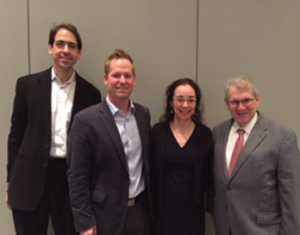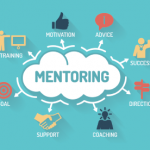
Speakers from the 2016 RRW session, Relevance of the NIH Strategic Plan: Roadmap from Concept to Successful Grant Application, from left: Peter Nigrovic, MD; Jeffrey Sparks, MD, MMSc; Alexis Ogdie-Beatty, MD, MSCE, and Stephen Katz, MD.
NAR studio / Shutterstock.com
The ACR Early Career Investigators (ECI) Subcommittee has organized two sessions at the 2017 ACR/ARHP Annual Meeting in San Diego. These sessions are devoted to serving the needs of early career investigators including junior faculty, fellows, graduate students and post-docs. Both sessions provide unique opportunities to optimize the research landscape for early career investigators.
Mentoring
The first session is on Tuesday, Nov. 7, from 7:30–8:30 a.m., titled Mentorship for the Next Generation of Rheumatologists: Current State and Next Steps. Alexis Ogdie, MD, MSCE, will detail current research focused on barriers and facilitators of a successful mentee–mentor relationship, which is crucial to success in research. These include two recent papers about research needs for early investigators and the mentee–mentor relationship produced by ECI.1,2
Peter Nigrovic, MD, will provide specific guidance on navigating the complex task of establishing and enhancing the mentor–mentee relationship from the perspectives of the mentee and mentor. He will also provide an overview on the experience of the ACR/CARRA Mentoring Interest Group for Pediatric Rheumatologists (AMIGO), which matches mentees and mentors in pediatric rheumatology.3,4
Grants
The second session is on Wednesday, Nov. 8, from 9:00–10:30 a.m., titled How to Find the Right Grant at the Right Time: Meet the NIH and Foundation Leaders. The goal of this session is to allow for grant writers at all stages to discuss specific questions with program officers or representatives of various grant programs in rheumatology. This unique session will have roundtables for NIH and various foundation representatives to allow attendees to engage one-on-one with potential funders. Program officers from NIAID and NIAMS, representatives from the Rheumatology Research Foundation as well as the National Psoriasis Foundation, Scleroderma Foundation, Vasculitis Foundation and the Arthritis Foundation are scheduled to attend. Attendees are invited to bring specific aims pages to gather instant feedback on the scope and fit for their project. Members of ECI Subcommittee will also be available to provide career development and grantsmanship advice. Brief introductory comments will detail the types of grants and timeline for application for investigators at various stages.
For more information about these sessions, download the Annual Meeting App.
Jeffrey Sparks, MD, MMSc, is a rheumatologist and population-scientist with an overall focus on using patient-oriented and epidemiologic research studies to evaluate the etiology, outcomes and public health burden of rheumatic diseases, such as rheumatoid arthritis (RA). In particular, he performs studies to evaluate genetic, environmental, serologic and familial risk factors for RA, clinical trials for RA prevention and outcomes research focusing on the respiratory burden of RA.
References
- Ogdie A, Shah AA, Makris UE, et al. Barriers to and facilitators of a career as a physician-scientist among rheumatologists in the US. Arthritis Care Res (Hoboken). 2015 Sep;67(9):1191–1201.
- Ogdie A, Sparks JA, Angeles-Han ST, et al. Barriers and facilitators of mentoring for trainees and early career investigators in rheumatology research: Current state, identification of needs, and roadmap to an inter-institutional adult rheumatology mentoring program. Arthritis Care Res (Hoboken). 2017 May 23. doi: 10.1002/acr.23286. [Epub ahead of print]
- Moorthy LN, Muscal E, Riebschleger M, et al. Efficacy of an interinstitutional mentoring program within pediatric rheumatology. Arthritis Care Res. 2016 May;68(5):645–651.
- Nigrovic PA, Muscal E, Riebschleger M, et al. AMIGO: A novel approach to the mentorship gap in pediatric rheumatology. J Pediatr. 2014 Feb;164(2):226-7.e1-3.



